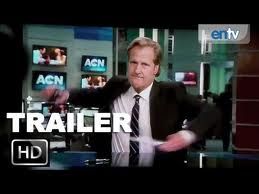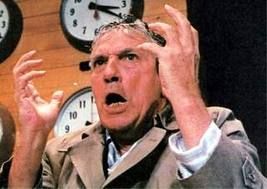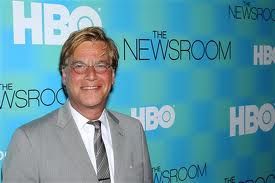
Optimism
HBO's "The Newsroom": Sorkin Talks Truth To Stupid
Every drama series needs an intelligent woman's perspective.
Posted July 13, 2012

Jeff Daniels-The Newsroom
Here's the thing: I just finished watching the premier episode of Aaron Sorkin's The Newsroom. Damn it, after all these years of resisting subscribing to HBO, I may have no choice. I fear "resistance is futile!"
Back-story of my resistance is this: Whenever DISH cable teases with a week of free HBO or other premium movie packages I end up watching dreck like Night of the Lepus or something Adam Sandler, just because it's there, available, enticing me into movie amniotics. I submerge mindless, floating in HD fetal space with a slack jaw and dilated pupils, fingers fingering crunchies of any sort. I don't need that. Hell, I can watch HBO when I'm dead.
I have obstinately resisted getting HBO for years, suffering askance eyebrows from my premium channel friends, because, frankly, I have too many entertainment options already. I don't need any more distractions to divert me from my writing obligations and joys of people contact in real, flesh-pressing time. I could rent the season when it's released. The trouble with that is, I don't think I want to wait that long. I have the same problem with Showtime's Homeland.
For me, almost anything Sorkin is a game changer. Aaron had me at hello with Sports Night and The West Wing. His film scripts include knockouts like A Few Good Men, The American President, The Social Network, and Moneyball.
Sorkin, like his compatriot, David E. Kelley (Picket Fences, Chicago Hope, The Practice, Boston Legal, is an unabashed liberal, (the non-euphemized label for progressive) whose series always explore the important and controversial social issues of the day. Sorkin's style is distinctive, smart, characters fast talking, fast moving-walking-living, lead men and women, intelligent, complex dialogue, stories ripped from the headlines with characters often more idealistic than realistic, more edgy than balming or therapeutic, more Al Pacino than Morgan Freeman (after his break-out pimp role in Street Smart, that is).
Something else is distinctive about Sorkin's writing: the political right and left usually make intelligent arguments for their positions. Those on the right are more noble adversaries, like George Will, AEI's Norm Ornstein, or the late William F. Buckley in his mature years, than risible one-dimensional buffoons like Sean Hannity or that brother from another planet, Glenn Beck. In Sorkin's menagerie of opinionators, few are easy marks or straw men.
Like those in The Newsroom, Sorkin's characters are human, flawed but with interesting neuroses. Moreover, in Sorkin's worlds, demographic minorities, especially women, are often deliberately over-represented in starring or featured roles. They portray very bright, high achieving, positive movers, at levels higher than they tend to be in demographic realities across, medical, political and entertainment occupational niches. Every drama series needs an intelligent woman's perspective. That's not pandering; it just makes things more interesting. Like in life.
The late, outstanding and acerbic screenwriter Paddy Chayefsky (Network, Marty, The Hospital) wrote movie and TV scripts satirizing and excoriating what's wrong in our culture, and did it brilliantly. Sorkin does the same for TV news but with a twist: showing newspeople and media moguls not so much as they are but as they should be.

Howard Beale-Network
But parathenthetically, no one will ever match the riveting, jaw-gaping chill of watching the Mephistophelian network mogul Ned Beatty read the riot act about "natural order of media things" to a bi-polar, stunned and cowed Peter Finch's character Howard Beale, "I'm mad as hell and I'm not going to take it anymore" in Network—if you haven't ever seen Network, do rent it. It's as timely in its take on network news today as it was in 1976.
Sorkin's artistic, imaginative choices and creations echo the poetic words of Bobby Kennedy when he ran for President in 1968, "There are those who look at things the way they are, and ask why, I dream of things that never were, and ask why not?" Perhaps that's why there's the portrait of news icon Edward R. Murrow on the wall of the office of Newsroom's Charlie Skinner—ACN News Division President of the fictional news network Atlantis Cable News (ACN), also popping up at other moments of transition on the show.
Murrow was arguably the high water mark of news courage and principle. He was the man who stood up both to Joseph McCarthy and William Paley, the head of CBS in the 1950s and who mentored the subsequent giants of TV news reportage like Walter Cronkite, Daniel Shore and Marvin Kalb, and so many others.
Highwater marks are what Sorkin reaches for in his writing. It's not so much Democratic or Republican he's addrerssing. It's the mythical America, the America of exceptionalism, the shining city on the hill, the lady with the torch in the New York harbor, an America which, in the show's premier episode protagonist-anchorman Will McAvoy (Jeff Daniels) splenetically criticizes as having pervasively lost its way.
And Emily Mortimer, playing McAvoy's ex-girl friend-now-his-producer/prodder, challenging, admonishing him to once again "speak truth to stupid, is a throw-away gem in the flood of words his characters so often unleash on audiences and others sharing the Sorkin screen. His take on fictional Americans in times of moral urgency, has effectively made flesh the famous quote from the late 19th century, civil war Union General and New York congressman, Carl Schurz,: "My country, right or wrong; if right, to be kept right; and if wrong, to be set right."
It is curiously refreshing to see America through the eyes of Aaron Sorkin. I feel less disposed to want to move to Canada; more disposed to stay put and push harder against greed and unenlightened self-interest. If good writing, good art, good literature is that which inspires, Sorkin is an inspiration. He writes role models for rehabilitating American politics and politicians and is now doing that for the Fourth Estate.

Aaron Sorkin
You can be sure that the first episode, which dealt with the BP disaster in the Gulf and the mainstream media's mishandling of initial reports, won't be Sorkin's last dramatic lens magnifying the political doings, comings and goings in the fossil fuel industries (oil, gas, coal). Hell, they comprise the most profitable business enterprise in human history and are still receiving government subsidies. I kid you not.
To me, Aaron Sorkin is a patriot, in the finest sense of the word; in the Carl Schurz's sense. I hope it stays on the air. On HBO it has a chance. It's subscription—not advertiser-supported. And it's already been renewed for another season. Critics have not been especially kind to the first few episodes. Perhaps it's because these are cynical, anti-heroic times in film and TV (cf., Suits, or House reruns).
Idealism needs optimism and that "hopey changey thing" that Barack Obama articulated in his books and his 2008 Presidential campaign. That's the unabashed hope that Sara Palin often derided and initially mocked at the first-ever National Tea Party Convention in 2010 when she said, "I gotta ask the supporters of all that, How's that hopey, changey thing working out for ya?"
It's hard out there for the optimist and idealistic screenwriter.
Hang in there, Aaron Sorkin. I publicly announce that I'm subscribing to HBO because and only because of The Newsroom. It's cancelled — I'm gone!



